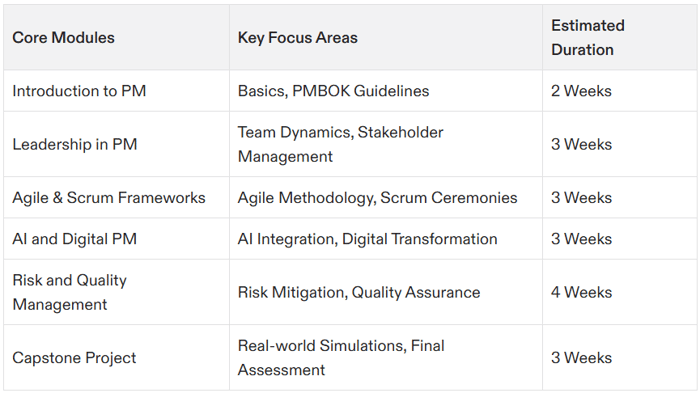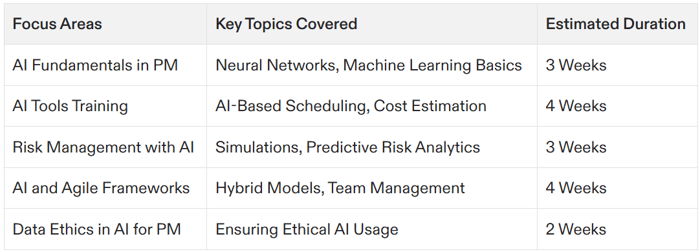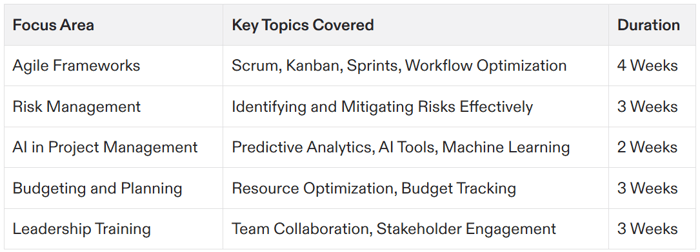Table of Contents
- Why Opt for a Construction Project Management Certification Online?
- What Is a Construction Project Management Certification?
- Core Skills Covered in Certification Programs
- Budget and Resource Allocation
- Benefits of Construction Project Management Certification Online
- How to Earn a Construction Project Management Certification Online
- A Typical Timeline for Certification Completion
- Less Commonly Known Facts About Construction Project Management Certifications
- Examples of Construction Project Management Certifications
- Conclusion
- FAQs
Imagine you're building a house of cards, but instead of cards, you're using skyscrapers and bridges. That's what construction project management is all about—turning blueprints into reality while juggling time, money, and people. In today's fast-paced construction industry, having the right skills and certifications can be the difference between a successful project and a costly delay. So, let's dive into the world of construction project management certifications and explore how they can catapult your career to new heights!
Why Opt for a Construction Project Management Certification Online?
In the construction industry, certifications are not just a nice-to-have; they're a must-have. They validate your skills, boost your salary, and open doors to leadership roles. But why go for an online certification? Here are a few compelling reasons:
Flexibility: Online certifications let you balance work and personal life with ease. You can study at your own pace, whether you're a busy professional or a new parent.
Global Access: With online certifications, you can enroll in prestigious programs from anywhere in the world. No need to relocate or take a break from work.
Affordability: Save on travel and accommodation costs compared to traditional classroom programs. Plus, many online certifications offer flexible payment plans.
Up-to-Date Curriculum: Online courses are often backed by industry leaders, ensuring you stay ahead of the curve with the latest tools and methodologies.
👉 Is a Project Management Certification Worth It? – Find out how a certification can impact your career and earning potential.
What Is a Construction Project Management Certification?
A construction project management certification equips you with the tools, frameworks, and skills to oversee construction projects from start to finish. It combines technical expertise, leadership skills, and strategic understanding of resource management. Whether you're managing a small renovation or a massive infrastructure project, this certification helps you navigate the complexities of construction management.
📌 Jobs with a Project Management Certification – Explore career opportunities available to certified professionals.
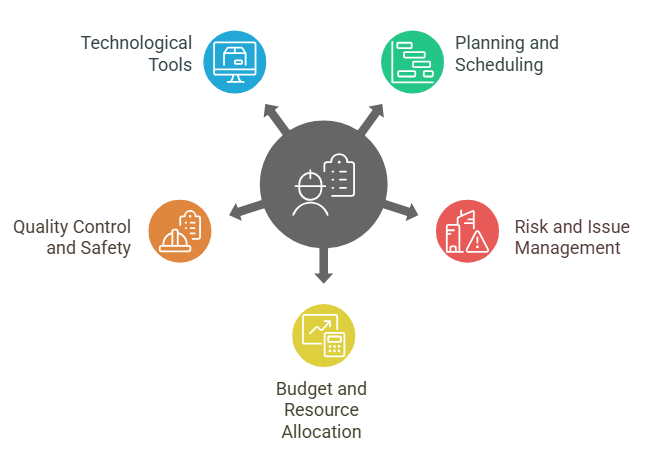
Core Skills Covered in Certification Programs
When pursuing a construction project management certification online, you'll develop a range of competencies that are essential for success in the field:
Planning and Scheduling
Planning and scheduling are foundational skills in construction project management. This involves creating detailed project timelines, setting realistic milestones, and allocating resources effectively. Here’s how this skill is developed:
Project Timelines: Learn to create Gantt charts, PERT diagrams, and other scheduling tools to visualize project timelines and ensure that all tasks are completed on time.
Resource Management: Understand how to allocate human resources, materials, and equipment efficiently to meet project demands without overextending resources.
Dependency Management: Identify and manage dependencies between tasks to avoid bottlenecks and ensure smooth project flow.
Adaptability: Develop the ability to adjust plans as needed due to unforeseen changes or challenges.
Risk and Issue Management
Risk and issue management are critical in construction projects, where unexpected events can significantly impact timelines and budgets. Here’s how you develop these skills:
Risk Identification: Learn to identify potential risks early in the project lifecycle, whether they are related to weather, supply chain disruptions, or regulatory changes.
Risk Assessment: Understand how to assess the likelihood and potential impact of identified risks to prioritize mitigation strategies.
Mitigation Strategies: Develop plans to mitigate risks, such as diversifying suppliers or implementing backup systems.
Issue Resolution: Learn how to address issues promptly when they arise, minimizing their impact on the project timeline and budget.
Budget and Resource Allocation
Effective budgeting and resource allocation are essential to ensure that projects are completed within budget and on time. Here’s how these skills are developed:
Budgeting: Learn to create detailed budgets that account for all project costs, including materials, labor, and overheads.
Cost Control: Understand how to monitor expenses throughout the project lifecycle and make adjustments as needed to stay within budget.
Resource Allocation: Develop strategies to allocate resources efficiently, ensuring that the right resources are available when needed.
Value Engineering: Learn techniques to optimize resource use without compromising project quality or timelines.
Quality Control and Safety Compliance
Ensuring high-quality outcomes and maintaining a safe working environment are paramount in construction projects. Here’s how these skills are developed:
Quality Standards: Learn to establish and enforce quality standards for materials and workmanship to ensure that projects meet client expectations.
Inspections and Audits: Understand how to conduct regular inspections and audits to identify and address quality issues early.
Safety Protocols: Develop and implement safety protocols to prevent accidents and ensure compliance with regulatory requirements.
Continuous Improvement: Foster a culture of continuous improvement by encouraging feedback and implementing changes based on lessons learned.
Technological Tools
Familiarity with cutting-edge technological tools is crucial for modern construction project management. Here’s how you develop these skills:
Building Information Modeling (BIM): Learn to use BIM software to create detailed digital models of buildings and infrastructure projects, enhancing collaboration and reducing errors.
Project Management Software: Understand how to use software tools like Asana, Trello, or MS Project to manage tasks, track progress, and communicate with team members.
Data Analytics: Develop skills to analyze project data to make informed decisions, optimize processes, and predict potential issues.
Collaboration Tools: Learn to use collaboration platforms to enhance communication and teamwork among stakeholders.
By mastering these core skills, you'll be well-equipped to manage complex construction projects effectively, ensuring they are completed on time, within budget, and to the required quality standards.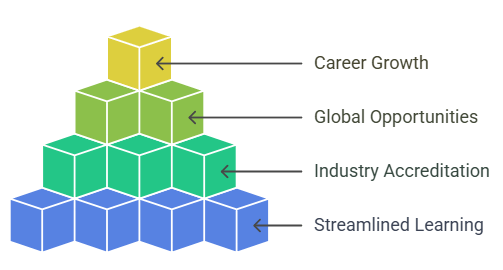
Benefits of Construction Project Management Certification Online
Higher Salary and Career Growth: Certified professionals often secure higher-paying roles and have better career prospects. A certification makes a compelling addition to your resume and opens doors to promotions.
Global Opportunities: Most online certifications are globally recognized. Whether you’re in the United States, the Middle East, or Asia-Pacific regions, a certification like APMIC ensures you’re eligible for international roles.
Streamlined Learning: Programs designed for online learning often include flexible schedules, pre-recorded lectures, and hands-on simulations to maximize understanding. This allows you to move at your own pace.
Industry-Recognized Accreditation: Whether you choose PRINCE2, PMP, or an exclusive APMIC certification, your credential will showcase your expertise in managing construction projects professionally.
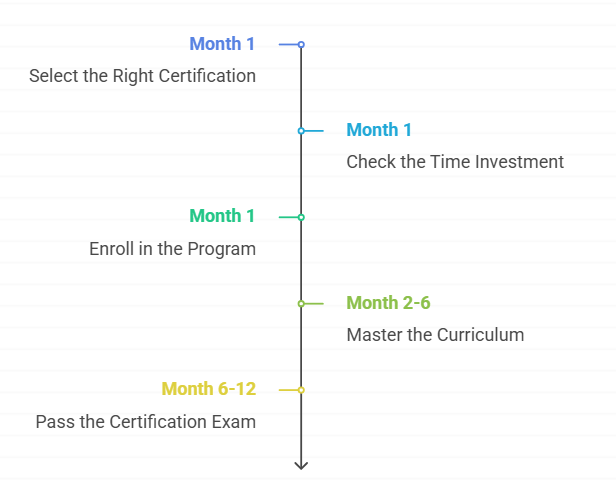
How to Earn a Construction Project Management Certification Online
Earning an online certification is straightforward, but it requires careful planning and effort. Here’s a step-by-step breakdown of how you can achieve this goal:
Select the Right Certification: Research certifications to identify those aligned with your career objectives. APMIC, PMP, and PRINCE2 are great choices depending on your goals.
Check the Time Investment: Typically, courses range from 3 to 12 months based on your pacing. APMIC's program can be completed in as little as 4–6 months.
Enroll in the Program: Visit platforms like APMIC or other certification bodies to enroll. Ensure you meet prerequisites, such as prior work experience or educational qualifications.
Master the Curriculum: Core modules typically include Project Planning, Risk Management, and Construction Finance. Dedicate consistent hours weekly to finish on time.
Pass the Certification Exam: Comprehensive exams assess your knowledge of tools like Agile, Scrum, or BIM. Some certifications also require practical applications of learned concepts.
A Typical Timeline for Certification Completion
The time required to complete a certification varies based on the program structure, prerequisites, and individual learning pace. The table above provides an estimated timeline for different project management certifications, helping you set realistic expectations.
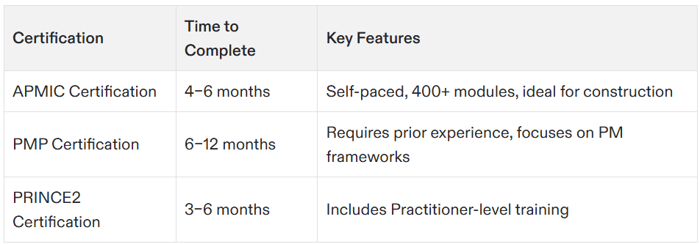
APMIC Certification: Typically takes 4–6 months to complete. This self-paced program includes 400+ modules and is well-suited for professionals in the construction industry.
PMP Certification: Requires 6–12 months, as it demands prior project management experience and focuses heavily on PM frameworks.
PRINCE2 Certification: Can be completed in 3–6 months and includes Practitioner-level training, making it ideal for those looking to gain practical expertise.
While these timelines provide a general guideline, online certification programs often offer flexibility, allowing learners to accelerate their progress based on their availability and commitment. If you're dedicated and can allocate more time per week, you may be able to complete the coursework faster.
Less Commonly Known Facts About Construction Project Management Certifications
Integration with Emerging Technologies: Many certifications now include modules on integrating AI and IoT into construction management to enhance efficiency and safety. (Source Link)
Sustainability Focus: There is a growing emphasis on sustainable construction practices in certification programs, reflecting industry trends towards green building. (Source Link)
Global Standards: Certifications like APMIC adhere to international standards, making them recognized worldwide. (Source Link)
Customizable Learning Paths: Some programs allow you to tailor your learning path based on your career goals or current projects.
Industry Partnerships: Many certifications are developed in partnership with major construction companies, ensuring relevance and practicality.
Continuous Learning: The construction industry is rapidly evolving, so certifications often require ongoing education to stay current.
Soft Skills Development: Beyond technical skills, certifications also focus on developing essential soft skills like communication and leadership.(Source Link)
Digital Badges: Upon completion, some certifications offer digital badges that can be displayed on professional profiles like LinkedIn. (Source Link)
Career Transition Opportunities: A construction project management certification can facilitate career transitions into related fields like real estate or urban planning.
Community Support: Many certification programs offer access to professional networks and communities for ongoing support and collaboration.
Examples of Construction Project Management Certifications
Pace University's Construction Project Management Certificate: This program provides practical knowledge in project cost estimation, scheduling, and managing key business concepts in construction. It is designed for individuals new to the field or those looking to enhance their skills in construction management.
PMP Certification: Offered by the Project Management Institute (PMI), the PMP is a globally recognized certification that tests a candidate’s ability to manage people, processes, and business priorities. It requires 35 hours of project management education and significant project management experience.
Conclusion
In the ever-evolving landscape of construction project management, having the right certification can be your ticket to success. Whether you're a seasoned professional or just starting out, an online certification can enhance your skills, boost your career, and open doors to global opportunities. If you're looking for a comprehensive and recognized certification, consider exploring the PMP Certification Prep Course available at app.apmic.org. This course is designed to equip you with the knowledge and skills needed to excel in construction project management.
FAQs
What is the difference between a construction project management certification and a general project management certification?
A construction project management certification focuses specifically on the construction industry, covering aspects like building codes, construction materials, and site management. In contrast, a general project management certification applies broadly across industries.
Can I specialize in a particular area of construction project management?
Yes, many certifications allow you to specialize in areas such as residential construction, infrastructure projects, or sustainable building practices.
How long does it typically take to complete a construction project management certification online?
The duration varies from 3 to 12 months, depending on the program and your pace.
Are online certifications as valuable as traditional classroom certifications?
Absolutely! Online certifications are globally recognized and offer the same level of credibility as traditional certifications.
What kind of support do online certification programs typically offer?
Many programs provide dedicated support through online forums, live sessions, and email support to ensure you stay on track.
Can I use a construction project management certification to transition into a related field?
Yes, the skills you gain are transferable to other fields like engineering, architecture, or real estate development.
How often do I need to renew my construction project management certification?
Renewal requirements vary by certification. Some, like PMI-CP, require renewal every three years.
Are there any scholarships or financial aid available for construction project management certifications?
Yes, some providers offer scholarships or financial aid to support students.



